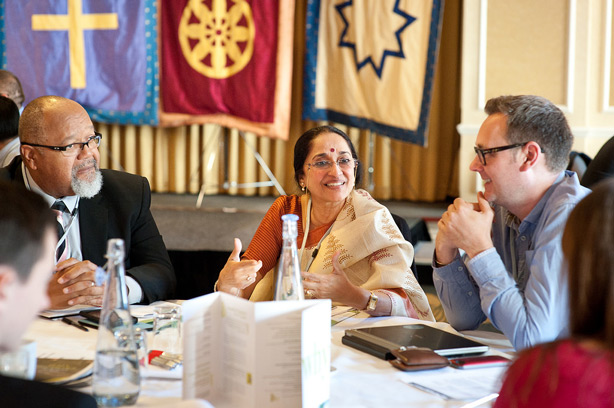The Bahá’í teachings are a unique tapestry woven from the threads of diverse spiritual traditions, embodying an array of noble ideals aimed at fostering unity and justice in an increasingly fragmented world. This guide seeks to elucidate how these ideals can be transformed into actionable frameworks that resonate meaningfully in contemporary society. While the allure of Bahá’í principles might initially stem from their emphasis on universal peace and inclusivity, deeper contemplation reveals an intricate labyrinth of ethical mandates and visionary perspectives on society’s evolution.
At the core of Bahá’í teachings is the concept of the oneness of humanity, a principle that posits an inseparable connection among all people, irrespective of race, religion, or nationality. This ideal challenges prevailing social paradigms and confronts the pervasive prejudices that fragment human relationships. The nuances of this oneness underscore a profound ethical obligation: as global citizens, individuals are called not only to acknowledge their interconnectedness but to actively promote understanding and cooperation amongst diverse communities. This is a significant undertaking, necessitating both personal and collective commitment.
To put this noble ideal into action, one must engage in the practice of active listening and empathetic dialogue. This involves cultivating spaces in which divergent perspectives can be expressed and examined. Such spaces can manifest in community forums, interfaith dialogues, or online platforms, wherein people model respectful conversation, listening to understand rather than to respond. Through these interactions, the act of collaboration transcends mere coexistence, blossoming into genuine engagement that empowers individuals to confront and dismantle systemic biases.
Furthermore, Bahá’í teachings advocate for social justice as an essential component of a harmonious society. The imperative for justice mandates more than a passive acquiescence to societal norms; it requires proactive measures to rectify inequities. Communities are encouraged to establish initiatives that address local injustices, such as educational disparities or economic inequalities. These local actions can galvanize larger movements, fostering a ripple effect of positive change. By manifesting this ideal, individuals not only contribute to personal growth but catalyze societal transformation.
An essential dimension of Bahá’í action is the integration of spirituality and service. Bahá’ís believe that inner development and outward service are intrinsically linked. Engaging in community service initiatives can take myriad forms, from establishing tutoring programs for at-risk youth to organizing ecological conservation efforts. Such initiatives are not merely acts of charity; they embody the essence of duty to humanity, enshrined within Bahá’í doctrine. Through sincere acts of service, individuals can experience a profound sense of purpose, moving beyond self-interest to embrace the collective well-being of society.
Moreover, the teachings underscore an intrinsic relationship between science and religion, propounding that both are essential to human advancement. This perspective invites an interdisciplinary approach to understanding complex global challenges. By embracing scientific inquiry while concurrently upholding spiritual values, Bahá’ís endeavor to forge new pathways to enlightenment and progress. This confluence engenders a critical dialogue that supports sustainable development and ethical technological advancement, vital components of addressing the pressing issues of our time.
Integral to the manifestation of Bahá’í teachings in action is the emphasis on education as a transformative force. Education is seen as the greatest investigative tool, vital for the empowerment of individuals and communities. Through comprehensive educational programs, Bahá’ís endeavor to create a culture of knowledge that nurtures critical thinking, creativity, and ethical reasoning. Education must transcend traditional paradigms; it should encompass moral and spiritual dimensions, equipping individuals with the competencies necessary to navigate an ever-evolving world. By prioritizing education, the Bahá’í community aspires to cultivate a generation of leaders who are equipped to tackle societal challenges with wisdom and compassion.
In tandem with educational endeavors, the role of youth within the Bahá’í framework is pivotal. The potent energy and innovative spirit of young people serve as catalysts for change. Youth are encouraged to harness their potential, taking ownership of their responsibilities as torchbearers for their generation. Through engaging in arts, sciences, and social initiatives, young Bahá’ís have the capacity to create initiatives corresponding to the unique challenges faced by their communities. This empowerment cultivates a sense of agency and purpose, vital for inspiring future generations.
Belief in the transformative nature of collective action anchors Bahá’í teachings. The concept of ‘consultation’ is foundational, wherein individuals are encouraged to engage in collective decision-making that reflects the collective conscience. This democratic ethos fosters unity and coherence, allowing for a synthesis of ideas and visions. When obstacles arise, consultation enables constructive dialogue, transforming conflicts into opportunities for growth. The corollary of this practice is the creation of resilient communities capable of navigating adversity through shared wisdom and collaborative effort.
Lastly, the aspiration to put noble ideals into action encompasses a commitment to sustainability. The Bahá’í perspective extols the responsible stewardship of the Earth, recognizing that humanity is entrusted with the preservation of the planet for future generations. Advocating for sustainable practices, both socially and environmentally, encapsulates the holistic nature of Bahá’í teachings. This includes an ethical obligation to create systems that are not only just but also sustainable, harmonizing human aspirations with ecological imperatives.
In conclusion, embodying Bahá’í teachings through actionable ideals requires a multifaceted approach that weaves together spirituality, service, justice, education, and sustainability. By operationalizing these principles, individuals can contribute to a world characterized by harmony, equity, and progress. As the complexities of modern society continue to evolve, the timeless wisdom of Bahá’í teachings offers a beacon of hope—a reminder that noble ideals are not merely aspirations, but actionable imperatives that, when embraced, can foster a more just and united world.
